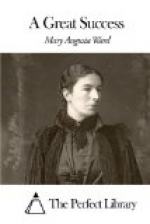And tumbling all his opened letters on the sofa, Arthur Meadows rose—in sheer excitement—and confronted his wife, with a flushed countenance. He was a tall, broadly built, loose-limbed fellow, with a fine shaggy head, whereof various black locks were apt to fall forward over his eyes, needing to be constantly thrown back by a picturesque action of the hand. The features were large and regular, the complexion dark, the eyes a pale blue, under bushy brows. The whole aspect of the man, indeed, was not unworthy of the adjective “Olympian,” already freely applied to it by some of the enthusiastic women students attending his now famous lectures. One girl artist learned in classical archaeology, and a haunter of the British Museum, had made a charcoal study of a well-known archaistic “Diespiter” of the Augustan period, on the same sheet with a rapid sketch of Meadows when lecturing; a performance which had been much handed about in the lecture-room, though always just avoiding—strangely enough—the eyes of the lecturer.... The expression of slumbrous power, the mingling of dream and energy in the Olympian countenance, had been, in the opinion of the majority, extremely well caught. Only Doris Meadows, the lecturer’s wife, herself an artist, and a much better one than the author of the drawing, had smiled a little queerly on being allowed a sight of it.
However, she was no less excited by the batch of letters her husband had allowed her to open than he by his. Her bundle included, so it appeared, letters from several leading politicians: one, discussing in a most animated and friendly tone the lecture of the week before, on “Lord George Bentinck”; and two others dealing with the first lecture of the series, the brilliant pen-portrait of Disraeli, which—partly owing to feminine influence behind the scenes—had been given verbatim and with much preliminary trumpeting in two or three Tory newspapers, and had produced a real sensation, of that mild sort which alone the British public—that does not love lectures—is capable of receiving from the report of one. Persons in the political world had relished its plain speaking; dames and counsellors of the Primrose League had read the praise with avidity, and skipped the criticism; while the mere men and women of letters had appreciated a style crisp, unhackneyed, and alive. The second lecture on “Lord George Bentinck” had been crowded, and the crowd had included several Cabinet Ministers, and those great ladies of the moment who gather like vultures to the feast on any similar occasion. The third lecture, on “Palmerston and Lord John”—had been not only crowded, but crowded out, and London was by now fully aware that it possessed in Arthur Meadows a person capable of painting a series of La Bruyere-like portraits of modern men, as vivid, biting, and “topical”—mutatis mutandis—as the great French series were in their day.




